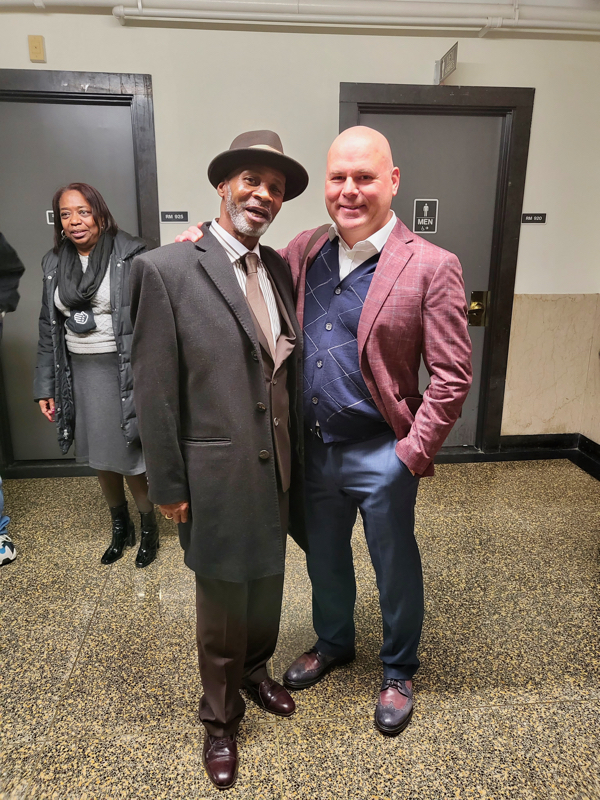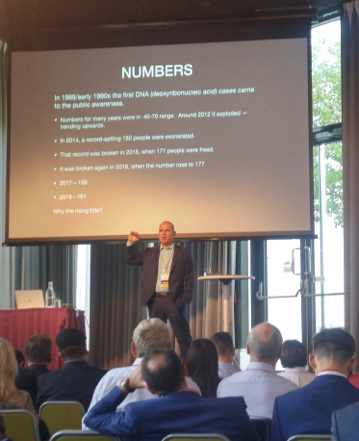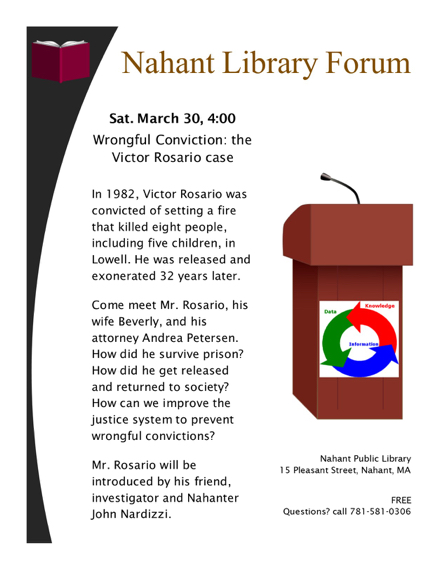wrongful conviction
Judge tosses out Raymond Gaines' 1976 murder conviction...
Dec.22.2022
This one came unexpectedly at the end of December, and we are trilled to see Ray Gaines out and about Boston (and shopping at the same hat shop as the owner of this PI firm). Ray's case involves a critical and disturbing juncture of Boston.
Gaines was sentenced to life in prison for the 1974 armed robbery and murder of Peter Sulfaro, the owner of a shoe repair shop in Roxbury. The defense investigation showed the witness identification of Gaines was "...the result of unduly suggestive police procedures". Errors included multiple viewings of photo arrays; police telling a witness he "picked the wrong people" - and then showing the same array with only the new suspects added. Newly discovered Brady material including Boston police records showing Det. Peter O'Malley arrested "drug shooting gallery" operator David Bass even while securing Bass's false affidavit (Bass faced criminal charges even while testifying against Gaines). Bass himself later recanted his testimony against Gaines in 1990. "The Commonwealth did not disclose the Bass affidavit for nearly 30 years--despite its obligation to do so."

Gaines was sentenced to life in prison for the 1974 armed robbery and murder of Peter Sulfaro, the owner of a shoe repair shop in Roxbury. The defense investigation showed the witness identification of Gaines was "...the result of unduly suggestive police procedures". Errors included multiple viewings of photo arrays; police telling a witness he "picked the wrong people" - and then showing the same array with only the new suspects added. Newly discovered Brady material including Boston police records showing Det. Peter O'Malley arrested "drug shooting gallery" operator David Bass even while securing Bass's false affidavit (Bass faced criminal charges even while testifying against Gaines). Bass himself later recanted his testimony against Gaines in 1990. "The Commonwealth did not disclose the Bass affidavit for nearly 30 years--despite its obligation to do so."

John Nardizzi presented at WAD 94th Annual Conference Stockholm Sweden
Aug.31.2019
John Nardizzi spoke about wrongful convictions at the World Association of Detectives 94th Annual Conference in Stockholm, Sweden. Headcount of raucous crowd shows Mr. Nardizzi outdrew ABBA tribute band.
"Breaking up is never easy, I know, But I have to go
Knowing me, knowing you It's the best I can do…"


"Breaking up is never easy, I know, But I have to go
Knowing me, knowing you It's the best I can do…"


Talk with exonerated client Victor Rosario - Nahant Library
Mar.24.2019
Enjoy the film "Shawshank Redemption"? Come hear the story of Victor Rosario, an innocent man who spent over 3 decades in prison after being convicted of arson in 1983. Victor will be speaking with his wife Beverly Rosario, his attorney Andrea Petersen, and his PI (me) on Sat. March 30, 4 PM.


Wrongful convictions and Chicago Police-
Jun.21.2012
Good piece on National Registry of Exonerations report that shows Cook County, Illinois leads the nation in documented wrongful convictions. The great majority of those cases -- 67 since 1986 -- were handled by the Chicago Police Department.
As the article notes, “That’s a number to be ashamed of. There are 67 cases in which the Chicago Police collected "evidence" of serious wrongdoing against a person who turned out to be innocent....More shocking still is this fact: the Chicago Police Department has never conducted an investigation, filed disciplinary charges or imposed discipline on a single police officer for negligence or any other form of wrongdoing in a single one of these cases. (Chief) Gerry McCarthy and his predecessors just don't care.”
As the article notes, “That’s a number to be ashamed of. There are 67 cases in which the Chicago Police collected "evidence" of serious wrongdoing against a person who turned out to be innocent....More shocking still is this fact: the Chicago Police Department has never conducted an investigation, filed disciplinary charges or imposed discipline on a single police officer for negligence or any other form of wrongdoing in a single one of these cases. (Chief) Gerry McCarthy and his predecessors just don't care.”
Beyond Bars: Dennis Maher moves on
Sep.01.2011
In a Boston Globe piece, Dennis Maher has moved beyond the wrongful conviction that took prime years from his freedom. “I got over losing the 19 years of my life,’’ says Maher, 50, in an even tone. “I don’t try and make up for it because I can’t. The best that I can do is just go forward. Don’t hold the anger.’’
In addition to his job at Waste Management, where he started working one month after his release, Maher speaks publicly at conferences and other events involved with wrongful convictions and the importance of access to DNA testing. “It’s part of the healing process,’’ says Maher. “I enjoy it.’’
In addition to his job at Waste Management, where he started working one month after his release, Maher speaks publicly at conferences and other events involved with wrongful convictions and the importance of access to DNA testing. “It’s part of the healing process,’’ says Maher. “I enjoy it.’’
1982 Lowell arson conviction may be reconsidered
Jun.27.2010
The Boston Globe did a piece on flaws in an arson investigation that led to the conviction of N&A INC client Victor Rosario. An appeal is being filed.
$3.1 million settlement for client in Ayer wrongful conviction
Sep.05.2009
Dennis Maher reached a $3.1 million settlement in his civil rights case against the town of Ayer. Maher was released from prison in April 2003 after having served 19 years of a life sentence for rape. He was exonerated when forensic tests revealed his genetic fingerprint did not match DNA evidence found at the scene of an alleged 1983 Ayer rape at the Caza Manor Hotel. Maher claimed his civil rights were violated due to the negligent management and training of Ayer Police Department investigators, including now-retired Officer Nancy Taylor-Harris.
Maher's civil case was based partly on evidence unearthed by private investigator John Nardizzi, who discovered that one of the alleged rape victims had faced criminal assault charges of her own during that era. These charges were dropped in exchange for her cooperation on the Maher case. Defense counsel was never told about the arrangement that Taylor and the Ayer Police had engineered with the victim/witness. The witness's criminal charge was transfered to another court and essentially disappeared from the public docket, only to be unearthed two decades later. The prosecutor who handled the Maher case later testified at his deposition: "Officer Taylor, in my opinion, engaged in misconduct by working some side arrangement with the victim not to prosecute her for a criminal case against the police department, and withheld that information from me."
Nardizzi also unearthed evidence that a key witness at trial, Richard Nichols, was well-known to Ayer Police and Nancy Taylor (who denied any memory of him in her deposition). Nichols was the son of a former police matron employed for decades at the Ayer Police Department. Moreover, Nichols had been arrested multiple times. Ayer Police were not able to produce any notes, reports, or statements from interviews with Nichols, despite the fact that a meeting between Nichols and Taylor was documented in a police log, and Nichols turned out to be the centerpiece of their case.
Maher's civil case was based partly on evidence unearthed by private investigator John Nardizzi, who discovered that one of the alleged rape victims had faced criminal assault charges of her own during that era. These charges were dropped in exchange for her cooperation on the Maher case. Defense counsel was never told about the arrangement that Taylor and the Ayer Police had engineered with the victim/witness. The witness's criminal charge was transfered to another court and essentially disappeared from the public docket, only to be unearthed two decades later. The prosecutor who handled the Maher case later testified at his deposition: "Officer Taylor, in my opinion, engaged in misconduct by working some side arrangement with the victim not to prosecute her for a criminal case against the police department, and withheld that information from me."
Nardizzi also unearthed evidence that a key witness at trial, Richard Nichols, was well-known to Ayer Police and Nancy Taylor (who denied any memory of him in her deposition). Nichols was the son of a former police matron employed for decades at the Ayer Police Department. Moreover, Nichols had been arrested multiple times. Ayer Police were not able to produce any notes, reports, or statements from interviews with Nichols, despite the fact that a meeting between Nichols and Taylor was documented in a police log, and Nichols turned out to be the centerpiece of their case.
Client Est. of Kenneth Waters wrongful conviction case will go to trial
Jun.09.2009
The civil rights case filed by client The Estate of Kenneth Waters will head to trial after a summary judgment motion file by defendants Town of Ayer, Nancy Taylor, et al. was rejected by the trial judge.
Kenneth Waters was wrongfully arrested and convicted. He served 18 years of a life sentence for the 1980 murder and armed robbery of Katharina Brow. Waters was released from prison after DNA evidence had revealed the blood of an unknown person at the murder scene.
Waters complaint alleged that the Ayer Police and Taylor's deliberate bad-faith suppression of favorable evidence led to his conviction – including suppression of evidence that Waters was not the source of the perpetrator’s bloody fingerprint on a piece of a toaster on the dining room floor; as well as suppression of Waters’ time card from work, which cemented his alibi. Taylor was also accused of used coercive and suggestive tactics to manufacture falsely incriminating statements from witnesses Brenda Marsh and Roseanna Perry.
Kenneth Waters was wrongfully arrested and convicted. He served 18 years of a life sentence for the 1980 murder and armed robbery of Katharina Brow. Waters was released from prison after DNA evidence had revealed the blood of an unknown person at the murder scene.
Waters complaint alleged that the Ayer Police and Taylor's deliberate bad-faith suppression of favorable evidence led to his conviction – including suppression of evidence that Waters was not the source of the perpetrator’s bloody fingerprint on a piece of a toaster on the dining room floor; as well as suppression of Waters’ time card from work, which cemented his alibi. Taylor was also accused of used coercive and suggestive tactics to manufacture falsely incriminating statements from witnesses Brenda Marsh and Roseanna Perry.
Court of Appeals Reverses Conviction of client Michael O'Laughlin
Jun.11.2009
In a rare decision upholding a lower court decision overturning a jury verdict, the 1st Circuit Court of Appeals overturned the Massachusetts Supreme Judicial Court [SJC] in the murder case of client Michael O'Laughlin. Citing the "the extremely high bar " in such instances, the court found in part: "Taken together, the circumstantial evidence in this case, even when drawing all reasonable inferences in favor of the prosecution, does not permit any rational jury to conclude that O'Laughlin was the assailant beyond a reasonable doubt." The opinion is notable for its thorough parsing--and ultimate rejection-- of the consciousness of guilt evidence cited by the SJC.
The court summed up the case as follows:
"A Massachusetts Superior Court jury had convicted O'Laughlin of the following counts: (1) burglary and armed assault in a dwelling; (2) armed assault in a dwelling; (3) armed assault with intent to murder; and(4) assault and battery by means of a dangerous weapon. The Superior Court then sentenced O'Laughlin to 35-50 years on Counts One and Two; 19-20 years on Count 3; and 9-10 years on Count 4, ruling that the sentences were to be served concurrently.
The intermediate Massachusetts Appeals Court reversed the judgments holding that there was insufficient evidence to support the verdicts. Commonwealth v. O'Laughlin, 830 N.E.2d 222 (Mass. App. Ct. 2005) (hereinafter "O'Laughlin I"). The Massachusetts Supreme Judicial Court ("SJC") reinstated the judgment reasoning that there was sufficient evidence to support the verdicts. Commonwealth v. O'Laughlin, 843 N.E.2d 617 (Mass. 2006) (hereinafter "O'Laughlin II").
O'Laughlin filed a petition for a writ of habeas corpus in the United States District Court for the District of Massachusetts on grounds that (1) the SJC's (which had ruled that was objectively unreasonable because there was insufficient evidence to support a guilty verdict and (2) that the SJC violated his constitutional right to present a defense. The district court denied O'Laughlin's petition for habeas relief.
After careful consideration, we reverse the judgment of the district court and order the district court to grant the petition. "
A full factual recounting of the case is found here. Michael remains in prison pending a state appeal for an en banc hearing by a full panel of 1st Circuit judges.
The court summed up the case as follows:
"A Massachusetts Superior Court jury had convicted O'Laughlin of the following counts: (1) burglary and armed assault in a dwelling; (2) armed assault in a dwelling; (3) armed assault with intent to murder; and(4) assault and battery by means of a dangerous weapon. The Superior Court then sentenced O'Laughlin to 35-50 years on Counts One and Two; 19-20 years on Count 3; and 9-10 years on Count 4, ruling that the sentences were to be served concurrently.
The intermediate Massachusetts Appeals Court reversed the judgments holding that there was insufficient evidence to support the verdicts. Commonwealth v. O'Laughlin, 830 N.E.2d 222 (Mass. App. Ct. 2005) (hereinafter "O'Laughlin I"). The Massachusetts Supreme Judicial Court ("SJC") reinstated the judgment reasoning that there was sufficient evidence to support the verdicts. Commonwealth v. O'Laughlin, 843 N.E.2d 617 (Mass. 2006) (hereinafter "O'Laughlin II").
O'Laughlin filed a petition for a writ of habeas corpus in the United States District Court for the District of Massachusetts on grounds that (1) the SJC's (which had ruled that was objectively unreasonable because there was insufficient evidence to support a guilty verdict and (2) that the SJC violated his constitutional right to present a defense. The district court denied O'Laughlin's petition for habeas relief.
After careful consideration, we reverse the judgment of the district court and order the district court to grant the petition. "
A full factual recounting of the case is found here. Michael remains in prison pending a state appeal for an en banc hearing by a full panel of 1st Circuit judges.